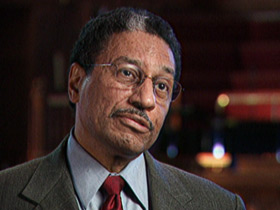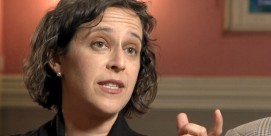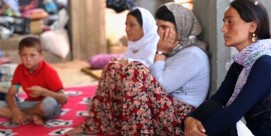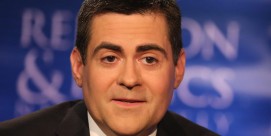In This Episode << SLIDE LEFT TO SEE ADDITIONAL SEGMENTS
Rev. Wallace Charles Smith Extended Interview
Read more of Lucky Severson’s interview with the Reverend Wallace Charles Smith:

All the pastors that I talk with are concerned about the black family, work to try and do something about it, have strong criteria as to what they expect from people before they perform marriages, talk to children rather often about lifestyle choices. The whole question of the African-American family and its strength or its weakness — you know, [Daniel Patrick] Moynihan did that famous — or infamous, depending on your assessment — [study] of the African-American family. You can’t understand the African-American family and its plight unless you understand what happened during slavery. I mean, it was an intentional attempt for several hundred years to destabilize families. It was for the good of the slave system not to have strong families. In fact, the families were too cohesive, and it wasn’t uncommon for a male or the children to be sold into some other community to keep the family from being so cohesive. And then after slavery, you know, the traditional sort of road gangs of African-American males going from city to city in the South just trying to find work was the precursor of the absentee African-American male. Had there been stable opportunities, job opportunities in the South after the Civil War and Reconstruction, [it] would’ve been a much different story.
[Herbert G.] Gutman did a book years ago called THE BLACK FAMILY IN SLAVERY AND FREEDOM, and it verifies that the numbers of families that were two-parent and staying together and actually running to the courthouse to actually have a regular marriage after slavery when they were permitted to was very high. I think what happened in the 1960s [was] the same thing that happened to America. The African-American community is almost always probably 15 to 20 years ahead of where the rest of America is, because of us being less protected economically. In the 1960s you began to see what most of America began to see in the 1980s. Economic factors were forcing the family into disarray. The whole notion of the 1950s and the rise of the middle class — that never quite struck the African-American family the same way. The sense that African-American families [were] unable to make ends meet and the time when the unions were growing in this country, lots of people were shut out of many of the unions, at least the upper levels — things like the steel industry, where African Americans never got the really good jobs. So what you found in the 1960s was just a huge number of African-American families that just couldn’t make ends meet. I could show you that wherever African-American families are on parity with Euro-American families, Asian families, and wherever else economically, you’re going to find about the same incidence of brokenness. Divorce rates will be about the same. If an African-American family and an Asian family income is somewhere around $65,000 or $70,000, the divorce rate will be almost identical. A lot of it is a class thing. Unfortunately, lots of things began to coalesce in the ’60s — the assassination of John Kennedy, the whole notion of society beginning to be less trustful of its leadership.
Cornel West wrote a great book called RACE MATTERS, and what West said basically is that beginning in the ’60s, but reaching culmination in today’s world, is the sense that black kids really don’t think that life is getting any better. When people stop thinking life is getting any better they become nihilistic. You see the same thing happening in white America right now. I mean, just this whole proliferation of, you know, a heavy metal culture, you know, where drugs are the wave. So-called middle-class kids cope with the stress and the pain of a world that doesn’t seem to be going anywhere. So white America in many ways is catching up to where black America has been, you know, unfortunately, for a long time.
I never drive down I-95 without the fear that I’m going to be hauled in because we have a fairly new car — for no other reason than just driving while black. If you’re an African-American, or in some cases Hispanic, there are incredible pressures from a too often racist society that can cause you to be on the wrong side of the law in a way that does not happen with our Euro-American brothers and sisters.
I have known Gene [Rivers] for years. I consider him a friend. Gene has a very important perspective, and he has a ministry of critiquing the church, which needs to be done. There’s no question that the African-American church has too often been seduced by either middle-class values or, you know, perhaps an individualistic disconnect from the conditions of poverty. Gene’s out there in the trenches, and he knows people and works with people on a regular basis who don’t come to our traditional churches. So he’s got an important voice. But the other side of it is, I think, the African-American church does way more than most people could see, because it’s different — I mean, the way we approach life. And we don’t answer surveys. You know, people knock on the door — they don’t get answers from us because that’s part of how we have had to exist. We’re suspicious of pollsters coming around. So you can’t always trust that sort of thing. I think more goes on than most people are aware of. But we still need the voice of Gene Rivers critiquing, because we all could do a much better job than we are doing.
We have an after-school program for at-risk boys. It’s really kind of a latchkey program. We don’t call it that, but that’s really what it is, where guys can come in after school and get tutoring, and we have a basketball gymnasium upstairs. They play basketball, they get tutoring, get mentored by a fine young gentleman, and other men of the church drop by to help out. There’s no charge for it. One of the real horror stories that I’ve had to live with over the years — they once had a grant from the Ford Foundation, which supported the program. They probably had 50 to 60 guys in the program. After the Ford Foundation grant ran out we determined we were going to keep the program going with volunteers and on a shoestring. We couldn’t do any more than 20 guys because we just didn’t have the people to meet with them and work with them. Lo and behold, two young fellows came in and wanted to get in the program; we had to turn them down because we didn’t have space. They went outside and there was a drive-by shooting and both of them were shot that same day. Neither was killed, thank God. One was wounded rather seriously. The other was not quite as seriously wounded. But here are two guys who, if the resources had been there, could’ve been in a program. And that story has probably been replicated all over this country thousands of times.
The African-American churches, like other churches, are swimming against the stream, and you got to be real honest about that. We’re living in a Hollywood-dominated culture. DESPERATE HOUSEWIVES is the biggest show on TV. Irresponsible sexuality jumps at us from every media outlet imaginable. People with means who can go to better schools are probably a little better insulated from that. People who don’t have means, who go to schools which, unfortunately, are often rather dysfunctional in their approaches, because they don’t have the resources, are less insulated from that. It’s been very difficult, and the churches are swimming against the stream. That’s really the issue.
I saw a piece in the paper about some of the more fashionable outer suburbs in Virginia where drug problems are starting to become a real issue. Having resources doesn’t completely prevent you from having to deal with these things, but it does give a little more insulation. Whereas if you’re an African-American in this country and unless you’re really in what the boys call the talented tenth, the elite, more than likely you are at the break point because you got no insulation. It’s like an electric cord, you know. If you take the rubber off it, then anybody can be electrocuted by it.
Many things in the Bush administration I don’t agree with. I think some of what, however, he has called for — working on individual responsibility — makes a lot of sense. But I think that can’t be promoted without some resources that, you know, can help with that. The Democrats, unfortunately, probably go the other way a little too much and remove the whole notion of individual responsibility. Somewhere the balance, I think, is in the middle. I think you’ve got to call for responsibility ultimately, you know, for all of us, whether you’re poor or rich. And it is your responsibility to say yes or no to life. But I think you got to put the kind of support structures in there so that people are better able to say no to those things that are destructive.
I think you could make the case that the so-called ethnic families, Irish families, Italian families historically did what African-American families have also done, and that is rely on an extended family. I think you could make the case that this mythology of the nuclear family is something that was a part of the American dream — the post-World War II expansionist dream of mother, father, and 2.3 children being able to happily survive. Look underneath that sort of iconic image and we found out from the 1950s LEAVE IT TO BEAVER on TV and FATHER KNOWS BEST — well, FATHER KNOWS BEST is a great example. The guy who played on that was an inveterate alcoholic. They had to sober him up to get him to the set. So I’m not sure that the concept of the nuclear family was ever as idyllic as we painted it. But what happened, I think, was ethnic families, African-American families in a survival mode brought some of their Old World concepts to this country, and that was that you took more than two parents to raise a family. Often there was a strong maternal figure and, certainly in the African-American culture, a grandmother. In the Italian culture it was often a strong paternal figure. But pretty much in the extended family there is a strong central person who holds it all together. For us, that has often been the African-American woman for a number of reasons. Some of it goes back to our African roots in Western African culture. Women always had a stronger role than they had in European culture. The notion of the subservient female was never a part of African culture. Then you bring that over to this country, and you put that along with the fact that African-American males were completely undermined economically. And often the only one who could make any money was the African-American woman. So she became the economic actor. It may not have been very much money, but she could work as a maid or she could take somebody’s laundry in, whereas the male was often without resources at all. Put all that together and you come up with a very strong African-American female presence that helped the family survive when otherwise they would have come completely undone.
Back in 1985 I did a book called THE CHURCH IN THE LIFE OF THE BLACK FAMILY and argued then that the church is really a model of the extended family. The church is really what the village was in Western Africa. We very actively promote the notion that the church is a family, and we try our best to get our men to mentor our young men, to have our mature women mentor the young women, and provide for our families where they are at the break points — a church structure where they can come, where they can find resources that they could not find if there was not a church. I mean the old village resources — somebody just to care about them.
I don’t agree that [black families are] crumbling. I do agree that the challenges are large and that it’s going to take an effort from all aspects of our community. Churches are going to have to play a larger role. I’d like to see every African-American church in this country understand itself as the modern-day village. Hillary Clinton, of course, took the old African proverb, and I think she was right to talk about it takes a village to raise a child. And then, of course, Rick Santorum or somebody came along and refuted that — a village is not enough or whatever. But the African-American church is the place where community can happen. And I think as our churches help rebuild community, then families will be stronger. We have a theme here at our church, for instance, and it’s called “Building God’s Village.” We see ourselves as creating a village in the church that has tentacles to the outside world and that ultimately can impact the community and change the community.
Models, for me, are people like former Congressman William Gray in Philadelphia. He still pastors a very fine church in North Philadelphia but has used his extraordinary influence to help with resources to network so that it’s to the advantage of the congregation. I think that’s the model that we need to promote — pastors connecting with the business community and connecting with the government in ways that we can deliver goods and resources to our people. The African-American church is an amazingly resourceful place that has done enormous good, when you think about it.







